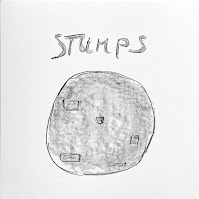With liner notes featuring a personal letter from Joëlle Léandre—quite an endorsement!—Contrabass player Kelsey Mines’ first solo record is an exciting adventure. It’s a personal document, an intimate encounter with her practice, a sound diary. Mines vocalizes throughout—not as a trained singer, but as a bassist allowing her voice to trail in and out of bass lines, intoning, tracing, at times sounding out words exploring their variety of timbre. Mines uses both the bass and her voice as source for found-sounds.
Throughout the recording, the musical pathways evolve and move. Ideas arise, and go places. The repetitions are considered choices each time. Nothing here is given in advance or taken for granted. One of the most admirable qualities of the recording is its chance-taking. So much of what we’re conditioned to hear and affirm is studio-polished, answering to a conception of perfection which turns against the unruly reality of experience with a demeaning squint, refusing the open encounter. Mines’ record feels unashamed and true. A genuine encounter with the possibilities of the upright bass. It’s a punk aesthetic, though not angry young man punk; more in the way of a practicing artist trying out all the colors, line types, and densities, seeing what works. The laborer’s craft. Honest expression over polish. Open studio day; we’re invited in.
Mines’ practice incorporates the vocalizing teaching from Odeya Nini’s “Free the Voice” workshops. (You can hear Nini’s stunningly beautiful and original improvised vocalizations here and here). “It’s not even about singing,” Mines explains. “It’s about sound, envisioning the sound as it comes out: manifest it, use the body and movement to connect to it, to ground it. . . . I would ask myself: ‘What am I afraid of? Let me do that thing.’ Why is it so scary? Okay, I should do it. We have a lot of fear around our voices, and the sounds that we make. We’re taught: we can only sing if it sounds ‘good.’”
Mines continues: “There’s a lot of judgement placed on people’s voices, and that’s terrible! When we’re kids we just want to sing, we want to dance, to move, to drum. That just gets trained out of us. When I’m formulating words, it’s uncomfortable, actually. If you’re vocalizing and you start saying a word, all of a sudden there’s something recognizable, so it can pull you out of that headspace of [sound as such], someone’s going to pull meaning from this, but I’m not going to shy away from it. [During sound checks, I insist:] Make sure the voice is not overpowering the bass. [The bass] is my comfort zone, so how can I do the thing that’s scarier?”
I pursue this a bit, and ask: What about this thing with fear and honesty? She laughs. “I don’t know, I’m pretty obsessed with that. I just want to give everybody else permission to not be perfect all the time. What do I have to share? During the pandemic I was playing by myself so much, I got very internal. Had some realizations about what makes art. It’s not what I used to think it was. The structures we have suck the joy out of music. It doesn’t have to be this polished thing."
I reviewed Mines’ earlier contribution on Here to Play (s/r, 2019), a great trio record with Neil Welch (ts) and Gregg Keplinger (d)). On Here to Play Mines' sound struck me as reminiscent of the hulking Dominic Duval (long-time collaborator with Joe McPhee). On Look Like, the forward confidence of Mines’ bow and finger work continues. The addition of her vocalizations changes the character completely of what’s on offer. We are privy to an internal dialogue. Mines’ vocalizations brings out the acoustical/natural sound of the bass, and the bass completes the voice. The most intriguing moments are when my ear/brain forgets or can’t discern which is which. At that point the musical cyborg manifests in sound neither accompanied nor augmented.
Mines received Seattle’s Earshot Jazz Emerging Artist Award in 2019. Now that the music scene is opening back up (after Covid shut-downs), Mines is in high demand. She is a major and positive force in the Seattle music world.
You can find Look Like on Bandcamp. If you love Look Like, you will want to listen to at least the first track of To actually create everywhere, also from 2022. The first piece is 16 and a half minutes of solo bass with vocalization, as strong and direct as anything on Look Like, and recorded in the same sessions as Look Like. (The other two tracks (29 minutes) fall under the heading of experimental chamber music: Trombone, bassoon, clarinet, bass, percussion, and some spoken word poetry written by Em Nitz-Ritter (“the unwieldy volume of my own voice”).)
For more of Mines’ work, see her websit.
Also worth seeking out is Mines’ contribution to the Wayward “In Limbo” Series, an incredible collection of 134 recordings (freely available on Soundcloud) commissioned by Steve Peters of the Wayward Music Series in Seattle. All contributions to "In Limbo" were recorded during lock-down and together represent the best free improvisers in Seattle. Mines’ recording is here.
















0 comments:
Post a Comment